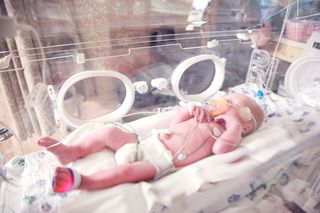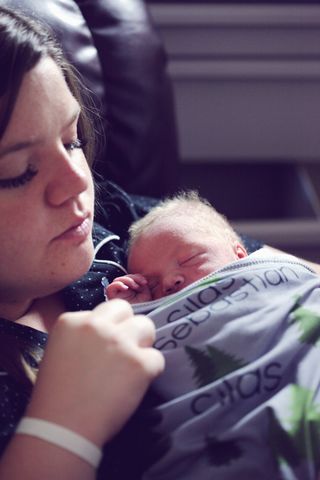Environment
The Power of a Mother's Voice
New research shows their mother's voice helps premature babies in the NICU.
Posted September 16, 2019 Reviewed by Hara Estroff Marano
The Neonatal Intensive Care Unit is a very noisy place. After 30 hours in the NICU as pediatric residents, we would still be hearing the bells and alarms ringing when we got home, and even in our sleep.
If the noisy NICU could disrupt us so much, we wondered how it might impact the development of the premature babies who lived there. Because of concerns like these, NICUs have come a long way in the work to reduce noise. Now, new research finds that the addition of their mother's voice may improve the developmental environment of premature babies.

One of the greatest medical advances of the late twentieth century has been the NICU, where 10% of U.S. babies receive care. This life-saving medical care has taken us from a time when 35 weeks gestation was life-threatening to a time when saving 24-week preemies (premature baby) is almost routine.
The NICU is a wonderful place, and it is also an extremely difficult place. Even as they care for the vulnerable babies who would not have been saved without their technology, neonatologists hope to provide a good environment for the babies' development.
NICUs are not easy on babies' development or sleep.
Even so, physiologic dysregulation is a problem for preemies who are cared for outside their mother's womb. While in the uterus, the babies are floating in water and hear the soothing shhhhhh sounds of blood flow in the placenta. Once born, it is simply harder for them to sleep in the noisy NICU. Further, babies in the womb hear their mother talking throughout her day, and after birth babies typically go home and hear a great deal of spoken language from their loved ones. In contrast, babies in the NICU hear a lot less spoken language, which may put them at risk for developmental language delay.
In an effort to avoid the problems caused by too much noise, NICUs have tried having babies in private or semi-private rooms where they can have quiet. Unfortunately, babies in quiet rooms are more likely to experience abnormal language development.
A study on the mother's voice.
That's why this recent study published in Pediatrics is important. This is the first time exposure to the mother's voice has been looked at as a way to modify neonatal sleep and development. The researchers enrolled 47 babies, gestational age 33 weeks and older.
The mothers were recorded as they read from two children's books, and then that recording was played for 6 hours to their baby. Here's what they found: Even though hearing the mother's voice contributed to the noisy environment, the babies nevertheless slept better when the voice recordings were being played. The difference in their sleep was not large, but the voice recordings appeared to help the baby continue sleeping even when things in the room got really loud.

As the babies were near term, age 35 weeks and up, they also woke up better and were more alert when they were listening to the recordings. That's good news because it means that when they were supposed to be awake, they were really tuning in to the spoken language. The hope is that this could translate into better language development.
A testament to the mother, but where is the father?
These are some exciting findings, and they bring us back to what we already know. A mother's loving voice is crucial in child development and the formation of our own adult well-being. But the study also leaves us with a question: Why did they examine mothers' voices and not fathers?
Perhaps it was thought that babies normally hear their mother's voice throughout the day while in the uterus. However, we do know that babies seem to recognize their fathers fairly quickly, likely because they hear them talking a lot, too.
Is there a possibility that this was a blind spot caused by the cultural schema around motherhood? The motherhood myth leads us to believe that mothers are simply more important to their children and that fathers lack the skills to nurture properly. Yet, there is good reason to believe that these beliefs are simply not true. It would be wonderful to see a trial with digital recordings of a father's voice in future studies.
References
Renée A. Shellhaas, Joseph W. Burns, et. al. (Sept., 2019) "Maternal Voice and Infant Sleep in the Neonatal Intensive Care Unit." Pediatrics.


